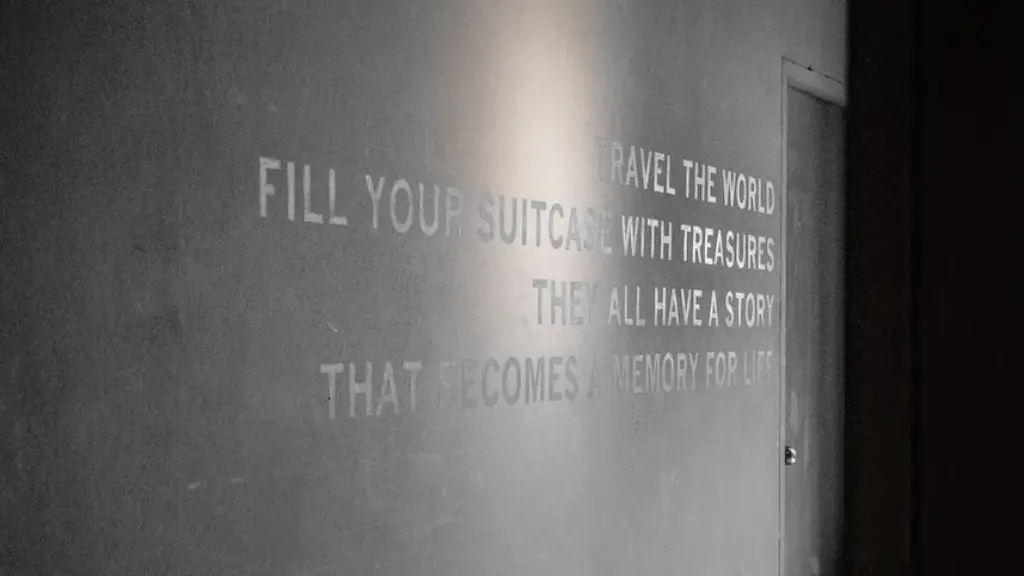Poetry is a unique and fascinating form of expression which dates back centuries. It is an art form that allows writers to express their thoughts and feelings by using carefully crafted words to paint vivid imagery and bring the written word to life. Poetry can be used to convey a theme, an idea, a particular emotion,telling a story,celebrating a special occasion or even to explore the depths of the human condition. In addition,poetry can be considered a form of self-expression, a way to express one’s thoughts,feelings and emotions without having to speak them aloud. However,poetry is not just about writing, but rather an opportunity to explore the emotions and experiences that are often too difficult to capture in words.
The beauty of poetry is that there is no single definition of what it is and what it can be. There are many different types of poetry, each with their own unique style and purpose. The most common types of poetry are lyric poetry, narrative poetry, free verse, haiku, sonnets, epics, odes and blank verse. Lyric poetry is often used to express emotions and feelings, or to capture an experience or moment. Narrative poetry tells a story, often through a series of events that are linked together. Free verse does not follow any traditional poetic structure, and haikus are concise, three-line poems that usually carry a deep emotional meaning. Sonnets are fourteen-line poems with a strict meter and rhythm, and epics are lengthy poems that tell a story on a grand scale. Odes are poems that celebrate or venerate a person or thing, and blank verse poems are unrhymed verses usually written in iambic pentameter.
When it comes to understanding poetry and tapping into its power and potential, understanding the various structures, having an eye for detail, being open to different ways of interpreting words, and developing a creative approach to writing have all been identified as important skills. In addition, being curious and exploring the poetic possibilities of language are qualities that are useful when engaging with poetry. Understanding the cultural context, the history of a particular poem and the inner workings of a poetic style can all help to give the reader a greater appreciation and understanding of the work.
Poetry can come in many forms, from long epics that tell a grand story, to short haikus that capture a moment in time. From captivating free verse, to sonnets that provide structure, poetry has a way of transforming words into something powerful and beautiful. There is something inherent in the poetic form that speaks to people, that touches upon something deep within the soul, and encourages us to explore the different and often complex emotions associated with life.
Elements Of Poetry
Poetry is composed of many different elements, each of which plays an important role in conveying the desired message or emotion. These elements include sound, meter, form and structure, imagery, symbolism, allusion and more. Sound plays an important role in poetry, with different sounds creating different effects – from long, drawn out vowels to short, sharp consonants, each sound has an impact on the overall piece. The meter of a poem is the pattern of stressed and unstressed syllables in each line, and this determines the rhythm and flow of the poem. Form and structure are the way a poem looks on the page, and each poetic style has its own unique form and structure. Imagery is the use of vivid and descriptive language, while symbolism is the use of a symbol or representation to refer to something else. Allusion is a reference to an event or concept which has wider cultural resonance.
Types Of Poetry
The various types of poetry can be broken down further according to their form, structure, and content. With lyric poetry for instance, there are many different sub-genres, from the classic sonnets of Shakespeare to the more contemporary spoken word poetry. Narrative poetry can take various forms, from the ancient epic poems, to the folk ballads which tell stories of love, loss, and adventure. For the modern reader, there are many different types of narrative poetry, from the traditional sonnets and haikus, to the more contemporary free verse or blank verse. When it comes to odes and epics, these can be further broken down into specific types, such as the epic poem, the ode to a particular person or thing, or the ode of celebration.
Modern Forms Of Poetry
Poetry has evolved and changed over time, and the modern era has seen many different forms. Rap and hip-hop are arguably the most popular modern forms of poetry, with poets like Kendrick Lamar and Jay-Z captivating their audiences with powerful words and creativity. Slam poetry is another popular form of modern poetry, where poets often perform their work in competitive events and competitions. Other popular modern forms of poetry include political poetry, protest poetry, spoken word and even graphic poetry.
The Power Of Poetry
The power of poetry lies in its ability to connect with people on a deeper level. Poetry enables us to explore the depths of the human condition, to think about our emotions and experiences in ways that can often be difficult to express in words. It transports us to another world, allowing us to see things through a different lens and to feel something that may have been lost or buried. For these reasons, poetry has become a powerful and popular form of expression which has been embraced by cultures all over the world.
Reflecting On Poetry
Reflecting on poetry enables us to gain an in-depth understanding of its purpose and meaning. It involves looking beyond the words and delving into the various elements of the poem, looking for clues and connections, and exploring the cultural and historical context. It also involves being open to different interpretations and points of view, which in turn can help to create a more meaningful and truly unique experience when engaging with poetry.
The Influence Of Poetry
Poetry has been a constant presence throughout history, often serving as a platform to comment on current events and to express feelings that have not been spoken. It also has political power, and many poets have used their work to stand up for social and political causes. From civil rights to women’s rights, poetry has always been at the forefront of galvanising people towards social and political change, and it continues to have a powerful influence that is being felt all around the world.
The Impact Of Social Media On Poetry
The emergence of social media has had a major impact on poetry, with poets now having their work seen and shared by a much wider audience. Poets are now able to reach more people, to engage with new audiences, and to explore new ways of expressing themselves through the written word. Social media also enables poets to connect with like-minded individuals, creating valuable conversations around poetry and the power of words.


